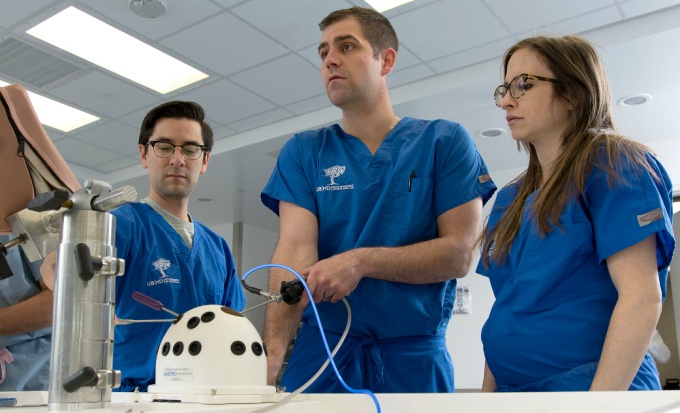Curriculum

Our current and former fellows — like (from left) Alexander Colen, DO; Grant Mathison, MD; and Danielle Phinney, DO — train to become well versed in the multiple subspecialty areas of hand and upper extremity surgery.
Our program is structured to provide a balance of clinical training, research and teaching experience in the line of hand and upper extremity surgery, including shoulder arthroplasty and arthroscopy.
You’ll gain clinical experience in areas including trauma, post-traumatic upper extremity reconstruction, microsurgery, arthritis, congenital neuromusculoskeletal disorders and tumor surgery.
Rotations and Training Sites
You’ll benefit from the large number of clinical training sites we offer by learning how to operate within distinct hospital systems. You’ll learn about the similarities and differences in structure, procedure, electronic medical records and policy between the different hospital systems.
We’ve designed our program to let you rotate through facilities including a Level I trauma center, a children’s hospital, a federal medical center, and a number of ambulatory centers.
Rotating through our clinical training sites will strengthen your medical knowledge of key areas including microsurgery, trauma, ambulatory experience, bone and soft tissue disorders, congenital deformities, military-related injuries and veterans’ health.
Our rotations will help you develop the skills you need to be capable of independent practice.
In-Depth Research
Research project
We understand the value of a research component during fellowship training, so we require all fellows to complete a research project.
Our faculty members have in-depth experience with research; in our department, it would not be difficult for you to find an attentive, knowledgeable mentor.
We hold research meetings on a quarterly basis. At these meetings, our fellows present their research materials to faculty members, then answer questions and make improvements and changes as suggested. These meetings are important. They will enhance the quality of your paper but also prove that you’re prepared to discuss research. Throughout your training, these meetings help prepare you to defend your position and also accept new aspects presented to you by other professionals. Prior to graduation, we’ll ask that you have a manuscript ready for submission.
Are you interested in presenting your research at conferences? We fund our fellows for meetings such as the annual meeting of the American Society for Surgery of the Hand. Many of our fellows have successfully presented their work at national meetings.
After you graduate from our program, we’ll continue to communicate with you to ensure that your paper has been submitted for publication.
Surgical skills lab
Here at the Jacobs School, we have a specialized microsurgical lab where you can perfect your microsurgical technique. You can set aside time to practice microsurgical techniques, which you can do often. We ensure that lab sessions are arranged monthly with the faculty member assigned to that month. The school’s gross anatomy lab, which has a robust anatomical gifts program, supplies specimens for this lab.
Each month, you’ll have a dedicated research day that you’ll spend primarily at the lab or preparing research for projects. Our faculty physicians will join you at the lab after office hours and surgical hours to hold a didactic or evaluative session.
Quality Assessment/Quality Improvement Project
In addition to a research project, all of our fellows complete a quality assessment/quality improvement project. The project must include an area in the program that can be improved, a detailed description of why and how the improvement must be made, and a description of the results of the improvement.
We have a quality improvement committee that meets on a quarterly basis. You would be responsible for discussing a topic for the project with faculty members in these meetings.
Conferences and Meetings
Our curriculum enables you to participate in a variety of meetings that complement the hands-on training you undertake in our rotations.
Leadership Experience
During rotations, you’ll interact with seasoned physicians and various members of different health care teams, giving you ample opportunities to refine your professionalism. There will also be instances where you’re collaborating with trainees — residents with varying levels of experience and sometimes even medical students undertaking electives. These are fundamental opportunities for you to sharpen your communication and leadership skills.
Further, we’ll ask you to participate in and help supervise resident activities and training.